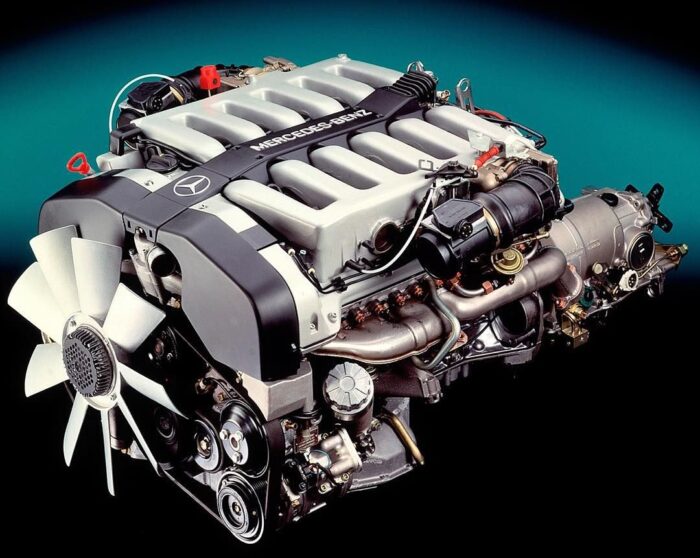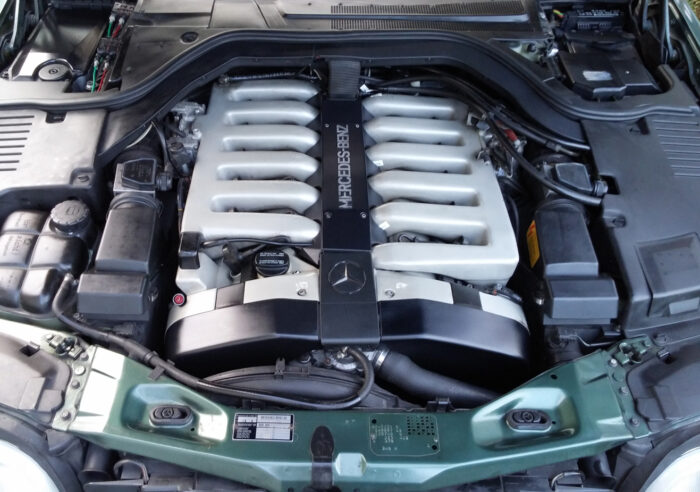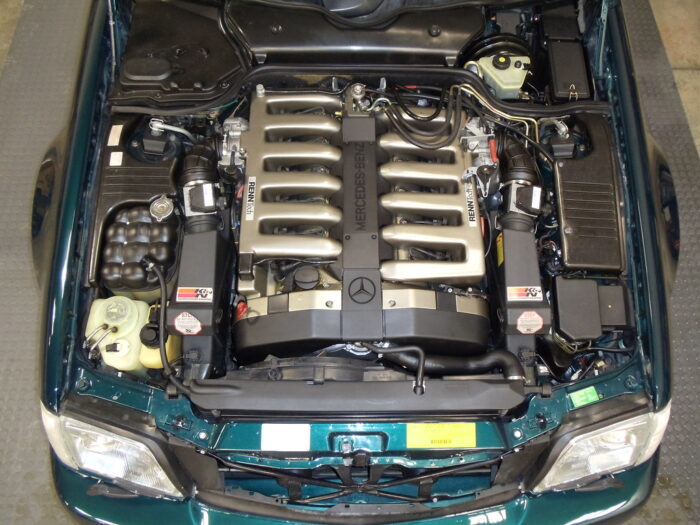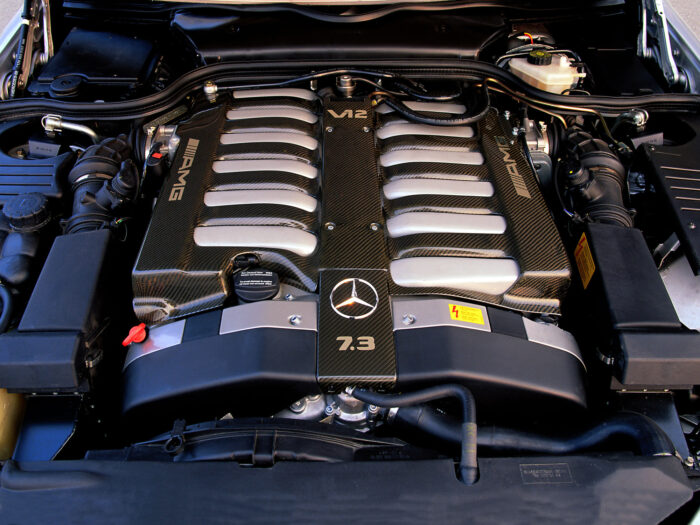The Mercedes M120 engine was introduced in the late 1990s and was used in certain Mercedes-Benz models, such as the S-Class, CL-Class, and SL-Class. It was a 12-cylinder engine with a 6-liter displacement and produced between 394 and 408 horsepower.
There were two versions of this engine, the M120.980 and M120.982, which differed in their internal construction and resulted in different characteristics and performance.
Engine specifications for Mercedes M120 6.0 l
Mercedes M120.980 6.0l
| Displacement | 5987 cc |
| Power system | Distributor Injection System |
| Engine power | 394 – 408 hp |
| Torque | 570 – 580 Nm |
| Cylinder block | Aluminum V12 |
| Cylinder head | Aluminum 48v |
| Cylinder diameter | 89 mm |
| Stroke | 80.2 mm |
| Compression ratio | 10 |
| Engine features | No |
| Hydraulic compensators | Yes |
| Timing Chain/Belt | Chain |
| Turbocharger | No |
| Oil capacity/Recommended oil | 9.5 l 5W-40 |
| Fuel type | Medium/Plus |
| Euro class | EURO 2/3 |
| Average lifespan | 350 000 km |
Mercedes M120.982 7.3 L
| Displacement | 7291 cc |
| Power system | Distributor Injection System |
| Engine power | 525 hp |
| Torque | 750 Nm |
| Cylinder block | Aluminum V12 |
| Cylinder head | Aluminum 48v |
| Cylinder diameter | 91.5 mm |
| Stroke | 92.4 mm |
| Compression ratio | 10.5 |
| Engine features | No |
| Hydraulic compensators | Yes |
| Timing Chain/Belt | Timing Chain |
| Turbocharger | No |
| Oil capacity/Recommended oil | 9.5 l 5W-40 |
| Fuel type | Medium/Plus |
| Euro class | EURO 2 |
| Average lifespan | 300 000 km |
The catalog weight of the M120 engine is 300 kg
The M120 engine number is located at the junction of the block and gearbox
M120.980 VS M120.982
The M120.980 and M120.982 are both V12 engines produced by Mercedes-Benz in the 1990s. While both engines are part of the same M120 engine family, they have some differences in their design and specifications.
The M120.980 was introduced in 1991 and was used in the Mercedes-Benz 600SEL and S600 models. It has a displacement of 6.0 liters and produces 402 horsepower and 428 lb-ft of torque. The engine features a single overhead camshaft per cylinder bank, four valves per cylinder, and a Bosch LH-Jetronic fuel injection system. The M120.980 engine also has an aluminum-silicon alloy block and cylinder heads, as well as forged steel connecting rods.

On the other hand, the M120.982 was introduced in 1993 and was used in the Mercedes-Benz SL73 AMG model. It has a larger displacement of 7.3 liters and produces 525 horsepower and 553 lb-ft of torque. The engine features dual overhead camshafts per cylinder bank, four valves per cylinder, and a Bosch ME fuel injection system. The M120.982 engine also has a reinforced aluminum-silicon alloy block and cylinder heads, as well as forged steel connecting rods and pistons.
Overall, both the M120.980 and M120.982 engines are impressive V12 engines produced by Mercedes-Benz in the 1990s. While the M120.982 has a larger displacement and produces more power, the M120.980 is still a powerful and advanced engine for its time.
The detailed comparison table between the M120.980 and M120.982 engines
| Specification | M120.980 | M120.982 |
|---|---|---|
| Displacement | 6.0 L | 7.3 L |
| Horsepower | 402 hp | 525 hp |
| Torque | 428 lb-ft | 553 lb-ft |
| Valvetrain | SOHC (single overhead camshaft) | DOHC (dual overhead camshafts) |
| Valves per cylinder | 4 | 4 |
| Fuel Injection | Bosch LH-Jetronic | Bosch ME |
| Block Material | Aluminum-silicon alloy | Reinforced aluminum-silicon alloy |
| Cylinder Head Material | Aluminum-silicon alloy | Reinforced aluminum-silicon alloy |
| Connecting Rods | Forged steel | Forged steel |
| Pistons | Cast aluminum alloy | Forged aluminum alloy |
| Bore x Stroke | 89 mm x 80.2 mm | 91 mm x 95 mm |
| Compression Ratio | 10.0:1 | 10.5:1 |
| Maximum RPM | 6,000 RPM | 7,000 RPM |
As shown in the table, the M120.982 engine has a larger displacement, more horsepower and torque, dual overhead camshafts per cylinder bank, and a more advanced Bosch ME fuel injection system. Additionally, the M120.982 has a reinforced aluminum-silicon alloy block and cylinder heads, as well as forged aluminum alloy pistons.
In contrast, the M120.980 has a single overhead camshaft per cylinder bank, a Bosch LH-Jetronic fuel injection system, and an aluminum-silicon alloy block and cylinder heads. However, it is still a powerful and advanced engine for its time, with 402 horsepower and 428 lb-ft of torque.
Overall, both engines are impressive V12 engines produced by Mercedes-Benz, but the M120.982 is a more advanced and powerful engine with newer technology and improved performance.
Fuel consumption for the Mercedes М120 engine
Fuel consumption is influenced by numerous factors such as driving style, road conditions, vehicle weight, maintenance practices, and even the age of the engine. These factors can vary from one driver to another, and as such, a detailed table of fuel consumption for the М120 engine would not be accurate or reliable.
However, as a general guide, the fuel economy for Mercedes М120 engine can range from 10-15 miles per gallon in city driving and 15-20 miles per gallon on the highway. This is just an estimate and may vary depending on various factors such as the vehicle configuration, driving conditions, and other related factors.
Which cars have the Mersedes М120 engine
| CL-Class C140 | 1991 – 1998 |
| S-Class W140 | 1992 – 1998 |
| SL-Class R129 | 1992 – 2001 |
Reliability of the Mercedes M120 Engine
The Mercedes M120 engine is generally regarded as a reliable engine, particularly when it is properly maintained. The engine is known for its durability, and many examples have been known to last for hundreds of thousands of miles with minimal issues. However, like all engines, the M120 is not immune to problems.

Common Problems with the Mercedes M120 Engine
Oil Leaks
Oil leaks are one of the most common problems with the Mercedes M120 engine. The valve cover gaskets and the oil pan gasket are the most common culprits. These gaskets can wear out over time, leading to oil leaks. Oil leaks can cause damage to other engine components and can also pose a fire hazard.
Misfires
Misfires are another common problem with the Mercedes M120 engine. A misfire occurs when one or more cylinders fail to ignite properly. This can cause a rough idle, a loss of power, and decreased fuel efficiency. Misfires can be caused by a variety of factors, including faulty spark plugs, ignition coils, or fuel injectors.
Vacuum leaks
Vacuum leaks can also cause problems with the Mercedes M120 engine. Vacuum leaks occur when there is a gap or hole in the intake manifold or vacuum lines. This can cause a variety of issues, including rough idling, a loss of power, and increased emissions.
Starter Motor Failure
Starter motor failure is another common problem with the Mercedes M120 engine. The starter motor is responsible for starting the engine, and if it fails, the engine will not start. This can be caused by a faulty starter motor or a bad connection.
Engine Wiring Harness Failure
The engine wiring harness is responsible for connecting various sensors and components to the engine’s computer. Over time, the wiring can become brittle and break, leading to electrical problems. This can cause a variety of issues, including a loss of power, rough idling, and poor fuel efficiency.
Crankshaft Position Sensor Failure
The crankshaft position sensor is responsible for telling the engine’s computer where the crankshaft is in its rotation. If the sensor fails, the engine may not start, or it may run poorly. This can be caused by a faulty sensor or a bad connection.
Throttle Actuator Failure
The throttle actuator controls the airflow to the engine, which is essential for proper engine performance. If the throttle actuator fails, the engine may not start, or it may run poorly. This can be caused by a faulty actuator or a bad connection.
Cooling System Issues
The Mercedes M120 engine requires proper cooling to function correctly. Cooling system issues can cause the engine to overheat, which can lead to serious engine damage. Common cooling system issues include a faulty thermostat, a leak in the radiator or coolant lines, or a malfunctioning water pump.
Camshaft Adjuster Magnet Failure
The camshaft adjuster magnet is responsible for adjusting the camshaft timing. If the magnet fails, it can cause a variety of issues, including a loss of power and decreased fuel efficiency. This can be caused by a faulty magnet or a bad connection.
Oxygen Sensor Failure
The oxygen sensor is responsible for measuring the oxygen levels in the exhaust system. If the sensor fails, it can cause a variety of issues, including decreased fuel efficiency and increased emissions. This can be caused by a faulty sensor or a bad connection.
Fuel Injector Failure
The fuel injectors are responsible for delivering fuel to the engine. If the injectors fail, it can cause a variety of issues, including a loss of power and decreased fuel efficiency. This can be caused by a faulty injector or a bad connection.
Spark Plug Failure
The spark plugs are responsible for igniting the fuel in the engine. If the spark plugs fail, it can cause a variety of issues, including misfires, a loss of power, and decreased fuel efficiency. This can be caused by worn-out plugs or a bad connection.
Ignition Coil Failure
The ignition coils are responsible for providing the spark that ignites the fuel in the engine. If the coils fail, it can cause a variety of issues, including misfires, a loss of power, and decreased fuel efficiency. This can be caused by a faulty coil or a bad connection.
Valve Cover Gasket Failure
The valve cover gasket is responsible for sealing the valve cover to the engine block. If the gasket fails, it can cause oil leaks and can lead to other engine problems. This can be caused by a worn-out gasket or a bad connection.
Solutions for the Common Problems
The solutions for the common problems with the Mercedes M120 engine vary depending on the specific issue. In some cases, the problem can be resolved by replacing a faulty part, such as a sensor or gasket. In other cases, more extensive repairs may be necessary, such as replacing the entire engine wiring harness or transmission.
Performance of the Mercedes M120 Engine
The Mercedes M120 engine is a high-performance engine that is capable of producing a considerable amount of power. The engine produces between 389 and 402 horsepower, depending on the model, and can propel the car from 0 to 60 miles per hour in around 6 seconds. The engine is also known for its smooth and quiet operation, which is a testament to its advanced design.
Maintenance
To ensure the longevity and reliability of your Mercedes M120 engine, it is important to perform regular maintenance. This includes oil changes, tune-ups, and other routine maintenance tasks. It is also important to have the engine inspected by a qualified mechanic on a regular basis to catch any potential problems early on.

The maintenance tasks required for the Mercedes M120 engine
| Maintenance Task | Frequency | Details |
|---|---|---|
| Oil and Filter Change | Every 7,500 miles or 1 year | Change the engine oil and filter to keep the engine lubricated and protect against wear and tear. |
| Spark Plug Replacement | Every 60,000 miles | Replace the spark plugs to ensure proper ignition and improve engine performance. |
| Air Filter Replacement | Every 30,000 miles | Replace the air filter to ensure clean air intake and improve engine performance. |
| Fuel Filter Replacement | Every 60,000 miles | Replace the fuel filter to ensure clean fuel delivery and prevent engine damage. |
| Coolant Flush and Replacement | Every 2 years or 30,000 miles | Flush and replace the coolant to prevent engine overheating and corrosion. |
| Timing Belt Replacement | Every 90,000 miles | Replace the timing belt to prevent engine damage and ensure proper engine timing. |
| Drive Belt Inspection | Every 30,000 miles | Inspect the drive belts for wear and tear, and replace if necessary to prevent engine damage. |
| Valve Adjustment | Every 60,000 miles | Adjust the valve clearance to ensure proper engine performance and prevent engine damage. |
| Transmission Service | Every 60,000 miles | Service the transmission to ensure proper shifting and prevent transmission damage. |
By following this maintenance schedule and addressing any issues early on, you can ensure the longevity and reliability of your Mercedes M120 engine. It is also important to have the engine inspected by a qualified mechanic on a regular basis to catch any potential problems early on.
Tuning
Here is a detailed table outlining some of the tuning options available for the Mercedes M120 engine, along with their estimated prices:
| Tuning Option | Description | Price Range |
|---|---|---|
| ECU Remapping/Chipping | Alter the engine’s electronic control unit (ECU) to optimize engine performance, increase horsepower, and improve fuel efficiency. | $500 – $1,500 |
| Performance Exhaust System | Replace the stock exhaust system with an aftermarket exhaust system to improve exhaust flow, increase horsepower, and enhance engine sound. | $1,000 – $2,500 |
| Cold Air Intake | Replace the stock air intake system with an aftermarket cold air intake system to improve air flow, increase horsepower, and improve throttle response. | $500 – $1,500 |
| Performance Camshafts | Replace the stock camshafts with performance camshafts to increase horsepower and torque throughout the engine’s RPM range. | $1,500 – $3,000 |
| High-Performance Spark Plugs | Replace the stock spark plugs with high-performance spark plugs to improve ignition and increase horsepower. | $150 – $500 |
| Forced Induction (Turbo or Supercharger) | Add a turbocharger or supercharger to the engine to significantly increase horsepower and torque. | $5,000 – $15,000+ |
It is important to note that these are only estimated prices and that actual prices may vary depending on factors such as the quality of the parts and the cost of installation.
By tuning the Mercedes M120 engine, you can significantly increase its performance and enhance your driving experience. However, it is important to work with a reputable and experienced tuner to ensure that the modifications are done correctly and do not cause damage to the engine. It is also important to keep in mind that some tuning modifications may affect the engine’s reliability and longevity, so it is important to weigh the potential benefits against the potential risks before making any modifications.
Price
The detailed table outlining the price range for the Mercedes M120 engine:
| Mercedes M120 Engine Model | Price Range |
|---|---|
| Used Mercedes M120 Engine (1990-2002) | $2,000 – $10,000+ |
| Remanufactured Mercedes M120 Engine | $8,000 – $15,000+ |
| Brand New Mercedes M120 Engine | $25,000 – $35,000+ |
The price of a used Mercedes M120 engine can vary greatly depending on factors such as the engine’s mileage, condition, and location. Engines with higher mileage or in poor condition may be priced lower than those in excellent condition with lower mileage. Additionally, engines from salvage yards may be priced lower than those from private sellers or dealerships.
Remanufactured Mercedes M120 engines are engines that have been rebuilt to meet or exceed the original manufacturer’s specifications. These engines typically come with a warranty and may include new parts such as pistons, bearings, and gaskets. The price of a remanufactured Mercedes M120 engine will vary depending on the quality of the rebuild and the level of customization or upgrades.

Brand new Mercedes M120 engines are rare and typically only available through Mercedes-Benz dealerships or authorized suppliers. These engines are the most expensive option, but they offer the highest level of reliability and performance. The price of a brand new Mercedes M120 engine will depend on factors such as the level of customization or upgrades, as well as the supplier.
It is important to consider the price and condition of the Mercedes M120 engine when purchasing a vehicle or considering an engine replacement. By doing research and comparing prices from multiple sources, you can ensure that you are getting a fair price for a high-quality engine.
FAQs
- Is the Mercedes M120 engine reliable? Yes, the Mercedes M120 engine is generally regarded as a reliable engine, particularly when it is properly maintained.
- What are the common problems with the Mercedes M120 engine? One of the most common problems with the Mercedes M120 engine is oil leaks. Another common issue is with the timing chain tensioners, which can fail and cause catastrophic engine damage.
- How can I maintain my Mercedes M120 engine? Regular maintenance, such as oil changes and tune-ups, is essential to ensure the longevity and reliability of your Mercedes M120 engine.
- Is the Mercedes M120 engine powerful? Yes, the Mercedes M120 engine is a high-performance engine that is capable of producing a considerable amount of power.
- Which Mercedes models were equipped with the M120 engine? The Mercedes M120 engine was used in a variety of high-end models, including the SL 600, S 600, and CL 600.
- Can I replace the timing chain tensioners myself? It is recommended to have a qualified mechanic replace the timing chain tensioners as it requires specialized knowledge and tools.
- Is it worth buying a car with a Mercedes M120 engine? If the engine is properly maintained and in good condition, a car with a Mercedes M120 engine can be a reliable and high-performance vehicle. However, it is important to have the engine inspected by a qualified mechanic before purchasing.
0 Comments